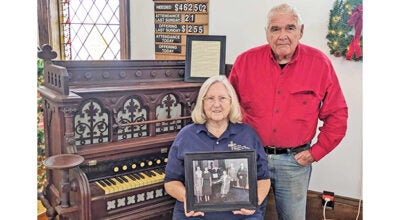Was another city ordinance what Jack needed?
Published 10:30 pm Thursday, December 16, 2010
Jack and Susan had worked hard together to establish their home.
 The mortgage on their home was half paid down.
The mortgage on their home was half paid down.
They made their home purchase 15 years ago and, as a result of their thrift and that timing of their purchase, the value of their home was still more than the principal amount still owed to the bank.
Their two children had been born healthy and were developing normally.
Their eldest, Jackson Jr., was nine years of age and in the fourth grade.
Patty, their daughter, was 7 years old and in the second grade.
Both children liked school and their grades showed satisfactory progress.
All of the family members worked together in the small garden each summer and Susan managed to freeze and can much of the produce.
Both Jack and Susan had been raised in Christian homes where church attendance on Sunday morning was a given.
Susan usually took the children to Sunday school.
Jack occasionally went with them, but usually there was just too much work demanding his attention to spare the time.
One of their two cars would need the battery exchanged or the oil and oil filter changed.
Or the lawn would need mowing and trimming around the shrubs.
Just cutting and splitting wood to be used later for house heat was very time-consuming.
Then Jack began drinking more often than before.
His dependence on alcohol became habitual and when he was intoxicated he became mean.
Jack beat up on Susan when drunk and the two children learned to hide and avoid him.
When sober, Jack would be sorry for what he had done and resolve to do better.
But family life became a round of confusion and abuse with periods of calm which were too short.
When Susan confided in her friend Mary about the situation at home, Mary was surprised.
When Mary’s husband Stanley got drunk he would become maudlin — weepy and sentimentally sorry for himself.
Susan and Mary attended the same church.
Each had talked with their pastor about their home problems.
Their pastor was not only sympathetic, he told them that they should help him persuade town officials to ban Sunday morning sale of alcoholic beverages.
If that concept could be made an ordinance for the town, then it might be that Jack and Stanley would come to church on Sunday mornings.
As Susan and Mary discussed their pastor’s advice, neither could be sure that there was much that the proposed prohibition of Sunday morning liquor sales would do much to help them with their problems at home.
Sunday blue laws had fallen into disfavor generally.
A prohibition against Sunday morning liquor sales would not prevent purchases at other times with availability in the home on Sunday morning and other times.
Bill Bradford retired to the rigors of a small farm in Pokagon Township. He has served as director of clinical laboratories in physician group practices and hospitals.
For a decade he was an educator in clinical laboratory sciences at Andrews University.





